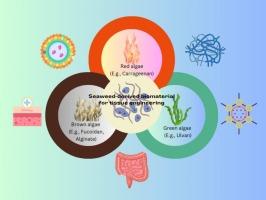海藻衍生多糖:用于肠道健康和伤口愈合的多功能生物材料
IF 4
2区 农林科学
Q2 FOOD SCIENCE & TECHNOLOGY
引用次数: 0
摘要
海藻衍生的多糖,包括卡拉胶、海藻酸盐、藻酸盐和岩藻聚糖,因其多功能生物活性和生物相容性而受到越来越多的关注,在组织工程、再生医学和胃肠道治疗中具有前景。这些海洋生物聚合物具有广泛的治疗特性,如抗氧化、抗炎、抗菌和免疫调节作用。在伤口修复和组织再生中,它们支持细胞增殖,增强机械稳定性,并能够控制生物活性化合物的递送。在炎症性肠病(IBD)的背景下,来自绿色(Ulva),红色(紫菜,江蓠)和棕色(海带,Undaria)藻类的多糖通过调节免疫信号通路,恢复肠道屏障完整性,促进有益微生物群和代谢物谱,在实验模型中显示出显着的益处。先进的应用包括用于3D生物打印的岩藻糖烷生物墨水和多糖衍生的纳米载体,进一步突出了它们在药物输送和治疗调节方面的潜力。总的来说,海藻多糖代表了一类有前景的天然生物材料,具有广泛的生物医学应用,值得继续研究和临床转化。本文章由计算机程序翻译,如有差异,请以英文原文为准。

Seaweed-derived polysaccharides: Multifunctional biomaterials for gut health and wound healing applications
Seaweed-derived polysaccharides including carrageenan, alginate, ulvan, and fucoidan have garnered increasing attention for their multifunctional bioactivities and biocompatibility, positioning them as promising agents in tissue engineering, regenerative medicine, and gastrointestinal therapy. These marine biopolymers exhibit broad spectrum of therapeutic properties such as antioxidant, anti-inflammatory, antimicrobial, and immunomodulatory effects. In wound repair and tissue regeneration, they support cell proliferation, enhance mechanical stability, and enable controlled delivery of bioactive compounds. In the context of inflammatory bowel disease (IBD), polysaccharides from green (Ulva), red (Porphyra, Gracilaria), and brown (Laminaria, Undaria) algae have demonstrated significant benefits in experimental models by modulating immune signaling pathways, restoring gut barrier integrity, and promoting beneficial microbiota and metabolite profiles. Advanced applications including fucoidan-based bioinks for 3D bioprinting and polysaccharide-derived nanocarriers further highlight their potential in drug delivery and therapeutic modulation. Overall, seaweed polysaccharides represent a promising class of natural biomaterials with wide-ranging biomedical applications, warranting continued research and clinical translation.
求助全文
通过发布文献求助,成功后即可免费获取论文全文。
去求助
来源期刊

Journal of Functional Foods
FOOD SCIENCE & TECHNOLOGY-
CiteScore
9.60
自引率
1.80%
发文量
428
审稿时长
76 days
期刊介绍:
Journal of Functional Foods continues with the same aims and scope, editorial team, submission system and rigorous peer review. We give authors the possibility to publish their top-quality papers in a well-established leading journal in the food and nutrition fields. The Journal will keep its rigorous criteria to screen high impact research addressing relevant scientific topics and performed by sound methodologies.
The Journal of Functional Foods aims to bring together the results of fundamental and applied research into healthy foods and biologically active food ingredients.
The Journal is centered in the specific area at the boundaries among food technology, nutrition and health welcoming papers having a good interdisciplinary approach. The Journal will cover the fields of plant bioactives; dietary fibre, probiotics; functional lipids; bioactive peptides; vitamins, minerals and botanicals and other dietary supplements. Nutritional and technological aspects related to the development of functional foods and beverages are of core interest to the journal. Experimental works dealing with food digestion, bioavailability of food bioactives and on the mechanisms by which foods and their components are able to modulate physiological parameters connected with disease prevention are of particular interest as well as those dealing with personalized nutrition and nutritional needs in pathological subjects.
 求助内容:
求助内容: 应助结果提醒方式:
应助结果提醒方式:


